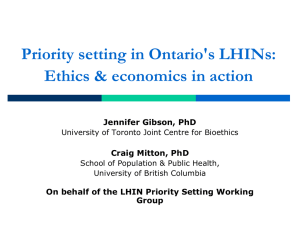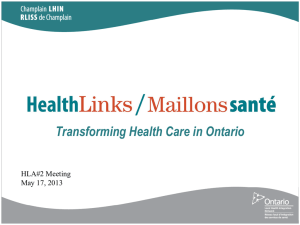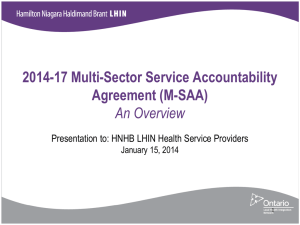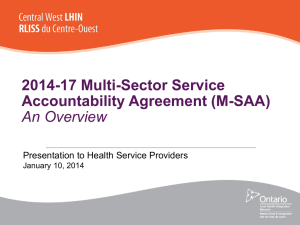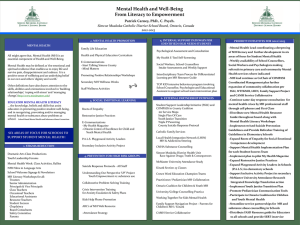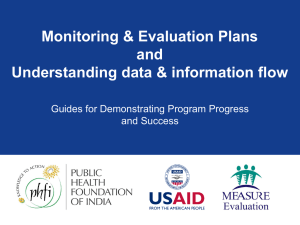2014-17 M-SAA Overview (20-Dec-13)
advertisement
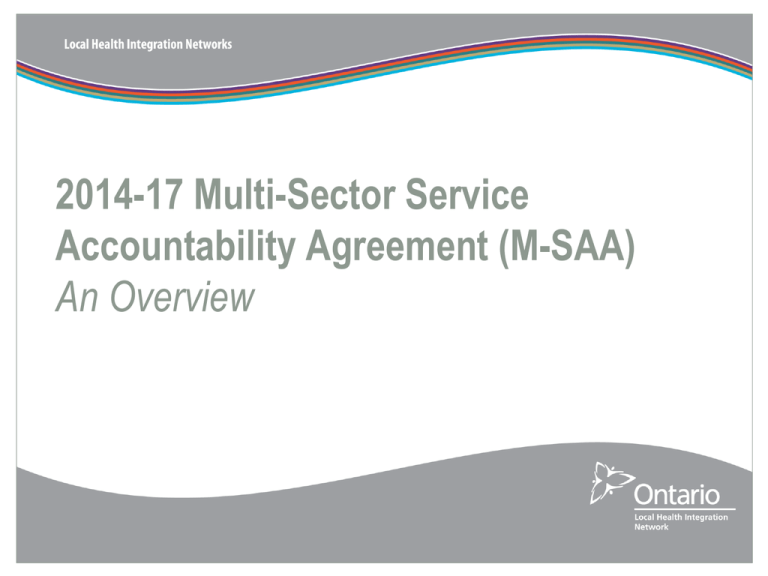
2014-17 Multi-Sector Service Accountability Agreement (M-SAA) An Overview What is an M-SAA? Core lever for HSP accountability and performance management • A tool to bring all the various contractual agreements between community HSPs and the LHINs into one document • Required under LHSIA and Ministry-LHIN Performance Agreement (MLPA) • A vehicle to delineate accountabilities and performance expectations • A mechanism to clarify that the HSP will be responsible for performance as well as planning and integration towards the development of a health system 2 Pan-LHIN Development, Local Execution Developing provincial templates for local execution • Consistent template agreement for all community sector HSPs developed through comprehensive consultation with HSP associations and member representatives. • Schedules for each sub-sector (CCAC, CHC, MH&A and CSS) developed through consultation with sub-sectors • Individual LHINs negotiate performance indicator targets with each HSP in alignment with panLHIN guidelines 3 M-SAA Structure Comprehensive Consultation through Multiple Tables M-SAA Advisory Committee (see slide 7 for membership) M-SAA Indicators Work Group (see Appendix 1 for membership) M-SAA Planning & Schedules Work Group (see Appendix 1 for membership) M-SAA INDICATOR SUPPORT: HEALTH SYSTEM INDICATOR INITIATIVE M-SAA LEGAL COUNSEL SUPPORT: LHIN LEGAL SERVICES BRANCH M-SAA SECRETARIAT SUPPORT: LHIN COLLABORATIVE LOCAL M-SAA IMPLEMENTATION: LHIN M-SAA LEADS 4 LHIN/HSP Accountability Relationship How do the various CAPS/M-SAA components fit together? Community Accountability Planning Submission (CAPS) Planning Multi-sector Service Accountability Agreement (M-SAA) Commitment Negotiations/Consultations Quarterly Reports [Ontario Healthcare Report Standards (MIS)] Measurement Remediation Negotiation, Implementation of Consequences Adjustment Negotiations 5 LHIN/Sector Responsibilities What are the responsibilities of the LHINs and the HSPs? LHINs are responsible for: • Training and supporting HSPs through the CAPS and M-SAA processes • Negotiating performance targets within the context of a provincial framework • Monitoring the achievement of specific performance goals under the M-SAA and ongoing performance management HSPs are responsible for: • Ensuring governance and operations that support high quality care • Promoting leading performance improvement approaches • Providing access to high quality health services and coordinated health care in an effective and efficient manner • Identifying integration opportunities and engaging the public and stakeholders in any planned service changes. 6 Process for Finalizing New M-SAA At a high level, how was the M-SAA developed and finalized? LHINs revised language in the 2011-14 M-SAA that required updating or would benefit from greater clarity as a draft 2014-17 M-SAA for sector feedback. 175 sector comments received and individually addressed. Committee endorsed 2014-17 M-SAA and Schedules on December 17, 2013. Pan-LHIN commitment to reduce, align and enhance consistency of local indicators. Committee will continued to meet throughout the life of the agreement to advance M-SAA related priority issues. 7 Summary of Main Changes What are the key changes between current and new M-SAA? REFERENCE DIFFERENCE REASON FOR CHANGE General Update A variety of changes were made to correct minor errors in references, use of defined terms, conformance and formatting. Revised “Board” definition. To correct inadvertent errors and typographical errors. 1.1 Definitions Added “controlling shareholder” definition. Added “and volunteers” to definition of “HSP’s Personnel.” Some long-term care homes have M-SAAs. The changes recognize that committees of management and boards of management are sometimes the ultimate authority, as opposed to boards of directors, for some long-term care homes. “Controlling shareholder” appears in the definition for HSP’s Personnel. A definition was provided for “controlling shareholders” in order to be clear on who is captured. It is only relevant to HSPs that have controlling shareholders. Volunteers and students are under the control of the HSP, no differently as regards the LHIN, than any of the HSP's paid staff or other agents. This provision clarifies that the HSP may hire others to provide the Services on the HSP’s behalf and states the terms on which they can do so. 3.2 Subcontracting Changed to enhance clarity. 3.4 eHealth/Information Technology Compliance 4.3 Appropriation Changed to conform to the LHINs’ obligations under the MLPA. LHSIA requires that LHINs provide their funding to HSPs in accordance with the LHIN’s accountability agreement with the Ministry (i.e. the MLPA). These changes are therefore required to conform to the LHINs’ obligations under the MLPA. Deleted the specific actions that a LHIN may take. This provision reflects the Financial Administration Act and the change was made to eliminate any implied notion that the LHIN is limited in terms of what actions it can take in the event that there is no appropriation of funds. 8 Summary of Main Changes Continued What are the key changes between current and new M-SAA? REFERENCE DIFFERENCE REASON FOR CHANGE 4.6 Interest Adjusted language to incorporate flexibility. This section has been revised to incorporate flexibility into this requirement. 4.8 Procurement of Goods and Services Changed to enhance clarity. The M-SAA requires HSPs to abide by all Applicable Law and Applicable Policy. To clarify the obligations, Section 4.8(a) has been revised to by inserting the phrase “that are applicable to the HSP pursuant to the BPSAA.” 6.1(c)(D) Multi-Year Planning Targets 6.3(a)(ii) Planning and Integration Activity Pre-Proposal Changed to reflect that LHINs typically consult with an HSP on changes multi-year planning targets. Changed to enhance clarity such that the obligation captures the notion of physical change. Changes to multi-year planning targets should be addressed at the local LHIN level. HSPs should discuss this issue with their local LHIN and ask for the appropriate assumptions for planning purposes. The LHINs are responsible for possible impacts to the health system of service changes and need to be made aware of changes to service delivery for health system planning purposes. In addition, this provision gives the LHIN the opportunity to review, evaluate and provide input into the HSP's plan, rather than being limited to stopping all or part of the plan. 8.1(d) Declaration of Compliance Changed to once per year and revised due date. Changed frequency to once per year and revised date to factor in time for HSPs to reconcile finances and close books before submitting declaration of compliance. The obligation now reads “Within 90 days of the HSP’s fiscal year-end.” 9.2(b) Acknowledgment of Funding Support Added to conform to Ontario’s Visual Identity Directives. Ontario and LHIN logos are strictly governed by Provincial policy. The provision in the M-SAA reflects what is required by Ontario’s Visual Identity Directives. 9 Summary of Main Changes Continued What are the key changes between current and new M-SAA? REFERENCE DIFFERENCE REASON FOR CHANGE 10.3(b) Governance Definition of “compensation award” added for clarity. The wording of the provision states that the compensation award is linked to the CEO’s performance and a definition has been added in this regard. 10.4(c) Funding, Services and Reporting 11 Limitation of Liability, Indemnity & Insurance 12.2(a) Termination by the HSP Revised to reflect materiality. Language has been added to incorporate notion of materiality. The insurance provisions have been significantly amended with input from the sector. The insurance provisions have been updated to reflect sector specific risk. Revised to reflect circumstances where an HSP may require the ability to exit the Agreement on short notice. Deleted to incorporate flexibility Section 12.2(a) has been revised by inserting "(or such shorter period as may be agreed by the HSP and the LHIN)". Adjusted language to reflect reasonableness. The LHINs’ are always obligated to act reasonably and fairly in making its decisions and they do so. Added language to enhance clarity This section now states “no assignment or subcontract shall relieve the HSP from its obligations under this Agreement or impose any liability upon the LHIN to any assignee or subcontractor.” 12.4(b) Consequences of Termination 14.3 Terms and Conditions on Any Consent 14.8 No Assignment Section 12.4(b) has been deleted to incorporate flexibility into process. 10 Performance Indicators Health System Indicators Initiative (HSII) • In April 2010, the LHIN-led HSII was established to create a coordinated, system-based approach to indicator identification, development, maintenance and reporting. • Central to the mandate of HSII is the close collaboration with provincial and national partners in order to leverage their organizational expertise related to indicator development, benchmarking, data extraction, and analysis. • The revised mandate introduced in September 2013 provides a greater focus on alignment to system priorities, advancing system performance improvement through the SAAs and other mechanisms, and enabling monitoring and reporting. • The M-SAA Indicators Work Group is accountable to the M-SAA Advisory Committee through the HSII Executive Group, comprised of 3 LHIN Senior Directors. 11 Performance Indicators (Schedule E) Pan-LHIN Performance Indicators and LHIN-Specific Obligations The Performance Schedule (Schedule E) contains the following two indicator sections: 1. Pan-LHIN Indicators are developed through the M-SAA Indicators Work Group through HSII (core indicators are relevant to all LHINs and all community sector HSPs; sector-specific indicators are only relevant to a specified sector). • Performance Indicators are measures of HSP performance for which a Performance Target is set; Technical specifications of specific Performance Indicators can be found in the “M-SAA 2014-17 Indicator Technical Specifications” document. • Explanatory Indicators are measures of HSP performance for which no Performance Target is set. Technical specifications of specific Explanatory Indicators can be found in the “M-SAA 2014-17 Indicator Technical Specifications” document. 2. LHIN-Specific Performance Obligations: A section where each LHIN adds specific performance objectives and obligations for their HSPs is included. LHINs are committed to minimizing any undue burden placed on providers with respect to performance management by focusing on a limited number of outcome indicators aligned with local priorities. 12 Performance Indicators Why Performance Standards? • All performance indicators have an associated target and standard of performance. Variance outside of the standard triggers the performance management processes in Article 7 of the M-SAA. • The LHIN or the HSP can identify a Performance Factor that “…could or will significantly affect a party’s ability to fulfill its obligations under the Agreement.” • The identification of a Performance Factor is made formally, in writing, to the other party and will include a description of the Factor’s actual or anticipated impact and a description of any action the party is undertaking, or plans to undertake, to remedy or mitigate the Performance Factor. 13 Performance Indicators Continued How are Indicator Targets and Corridors Determined? • Following the submission of the CAPS, LHINs and HSPs discuss indicator targets that are appropriate to each organization and its local circumstances. Targets are expected to reflect performance and drive continuous improvement. • To complete the targets and corridors for the performance indicators, the following principles will be employed: • Where provincial targets and corridors exist, the LHINs and HSPs will take these into consideration • Where appropriate, use past experience from M-SAA and MLPA indicators • Incorporate analyses of historical variation to inform corridor recommendations • Use % range for financial and volume indicators 14 Performance Management How are Performance Factors Addressed? How a LHIN chooses to deal with an indicator outside the corridor depends on a number of factors, including: • • • • • What is the realized and/or potential impact on the clients served? Is this the first blip on an otherwise clean performance record? Is this a unique event and unlikely to recur? Are other areas of the organization or other HSPs affected? What is the LHINs confidence in the HSPs ability to manage performance going ahead? Depending on the above, the LHIN could choose to start with a less formal tact. The formal process is always available...and can be triggered at any point. 15 2014-17 M-SAA Indicators 16 Core (All Sectors) Performance Indicators • • • • • • • • Balanced budget - Fund type 2 Proportion of budget spent on administration Variance forecast to actual expenses Percentage total margin Service activity by functional centre Variance of forecasted to actual units of service Number of individuals served Percentage of Alternative Level of Care (ALC) days (transitioned from sector specific to core) LHIN Collaborative 17 Core (All Sectors) Explanatory Indicators • • • Cost per individual serviced by program/service/functional centre Cost per unit of service by functional centre Client experience (New Category) Details: – Moved from being only an explanatory indicator for North West LHIN to a provincial core indicator. LHIN Collaborative 18 Community Care Access Centres Performance Indicators • • • Access: Wait time 1. From Hospital Discharge to Service Initiation (Hospital Clients) Access: 90th Wait time 2. 90th percentile Wait time from Community Setting to Community Home Care Services Percentage people registered with Health Care Connect who are referred (Retired) Details: – Reporting obligations are already in place with the Ministry LHIN Collaborative 19 Community Care Access Centres Explanatory Indicators • • • • • Access: Wait time 1. From hospital discharge to service initiation (hospital clients) by population groups (short stay, short stay rehab, long-stay complex) Access: Wait time 2. 90th percentile wait time from Community setting to community home care services by population groups (short stay acute, short stay rehab, long-stay complex) Average monthly cost per episode (adult short stay, adult long-stay complex, end of life, children medically fragile) Clients with MAPLe scores high and very high living in the community supported by CCAC Clients placed in LTCH with (New Category) MAPLe scores high and very high as a proportion of total clients placed (New Category) LHIN Collaborative 20 Community Care Access Centres New Category Explanatory Indicators • • Clients with MAPLe scores high and very high living in the community supported by CCAC Clients placed in LTCH with MAPLe scores high and very high as a proportion of total clients placed Details: – Moved from CCAC performance indicator category – Indicators fit this category and provide valuable information about how the system is functioning and the opportunities for change – Indicators are not a good measure for performance as targets are set locally by each LHIN LHIN Collaborative 21 Community Care Access Centres Developmental Indicators • • • Percentage of clients with a new or existing pressure ulcer that failed to improve (Retired) Medication safety (Retired) Percentage of home care clients who say they have fallen in the last 90 days (Retired) Details – Indicators retired as developmental – Indicators were not identified by HQO as on the Common Quality Agenda LHIN Collaborative 22 Community Support Services Explanatory Indicator • Number of persons waiting for service (by functional centre) LHIN Collaborative 23 Community Support Services Developmental Indicators • • • Average number of days waited for first service (by functional centre) (New Category) Details: – Moved from CSS Explanatory indicator category as the data is not yet available – Move to explanatory in years 2 or 3 Repeat unscheduled emergency visits within 30 days for mental health conditions (Retired) Repeat unscheduled emergency visits within 30 days for substance abuse conditions (Retired) Details: – Indicators are difficult to measure as cannot follow clients between the hospital and the community LHIN Collaborative 24 Community Health Centres Performance Indicators • • • • • • • • • Cervical cancer screening Colorectal Screening rate Inter-professional diabetes care rate Influenza vaccination rate Breast cancer screening rate Periodic health exam Vacancy Rate (for NPs and Physicians) Access to primary care clinical service (New) Individuals served by functional centre (Retired) Details: – Already a Core indicator LHIN Collaborative 25 Community Health Centres Explanatory Indicators • • • • • • • • Emergency visits best managed elsewhere (New) Client satisfaction – Access (New) Clinical support staff per primary care provider (New) Cultural interpretation (New) Exam rooms per primary care provider (New) New grads/new staff (New) Number of new patients (New) Non-Primary Care activities (New) LHIN Collaborative 26 Community Health Centres Explanatory Indicators Cont’d • • • • • • • Number of registered clients (New) Specialized care (New) Supervision of students (New) Third next available appointment (New) Non-insured clients (New) Repeat unscheduled emergency visits within 30 days for mental health conditions (Retired) Repeat unscheduled emergency visits within 30 days for substance abuse conditions (Retired) LHIN Collaborative 27 Community Health Centres Developmental Indicator • CHC clients hospitalized for Ambulatory Care sensitive conditions LHIN Collaborative 28 Community Mental Health & Addiction Explanatory Indicators • Number of days waited from referral/application to initial assessment complete • Average number of days waited from initial assessment complete to service initiation • Repeat unscheduled emergency visits within 30 days for mental health conditions (New Category) • Repeat unscheduled emergency visits within 30 days for substance abuse conditions (New Category) Details: Moved to Explanatory indicator LHIN Collaborative 29 Community Mental Health & Addiction Developmental Indicator • OCAN/GAIN Indicator LHIN Collaborative 30 North West LHIN Specific – Local Indicators/Obligations 31 North West LHIN Specific Local Indicators Cost per Unit (All Sectors) Number of CCPD Clients (CCAC only) Number of Hip and Knee Clients (CCAC only) Admission/Readmission Rates for Active CCAC Clients to Hospital Rate per 100 (CCAC only) CCAC Waitlist (CCAC only) 32 Home First Philosophy requirement To contribute to an improved health system, the HSP will align their strategic and operating activities with, and proactively adopt the North West LHIN’s “Home First” philosophy. As requested by the North West LHIN, the HSP will collaborate with stakeholders with planning, implementation and reporting related to adoption of the Home First philosophy. 33 Diversity Planning requirement The HSP will implement their LHIN approved cross-cultural competency plan. In cases where the plan has not been endorsed by the LHIN, the HSP will work with the LHIN to amend the plan as necessary. The HSP will report back on progress made on implementation as requested by the LHIN. 34 Behavioural Supports Ontario (BSO) Action Plan requirement The Health Service Provider will work with the North West LHIN and partners to: • Implement the Behavioural Supports Ontario Action Plan and participate in quality improvement training related to the Behavioural Support Ontario Strategy; • Integrate care for the target population through the creation of common care pathways and commit to training of front-line staff as it relates to this strategy. 35 Emergency Preparedness Plans requirement To minimize risks to the North West health system, the HSP review and update its emergency preparedness plan annually and include in the plan the process for communication with the North West LHIN in the event of a emergency situation. 36 e-Health requirement The HSP will participate in the development and implementation of a harmonized North West LHIN eHealth Strategic Plan and subsequent iterations of that plan 37 Information Technology requirement The HSP will ensure that any Information Technology/Information System implementations material to provincial (eHealth Ontario) and local (North West LHIN) eHealth Strategic and Tactical Plans will be aligned with and contribute to the advancement of these Plans 38 Health Services Blueprint requirement The North West LHIN is implementing the North West LHIN Health Services Blueprint (the Blueprint), a ten-year plan to reshape the health care system in the North West LHIN. The provincial Health Link initiative is aligned to this local plan and is being implemented in conjunction with the Blueprint at the Integrated District Network level. More details about the Blueprint and Health Links in the North West LHIN are available at http://www.northwestlhin.on.ca/. To advance the implementation of the Blueprint, the HSP will: Align their strategic and operating activities with the Blueprint and Health Link objectives and local priorities; Continue to collaborate with stakeholders with planning, implementation and reporting related to the implementation of the Blueprint and Health Links, and formalize this commitment to collaboration through a Collaboration Agreement (e.g. providing human resource expertise, information, data and analysis to the North West LHIN, Health Link Steering Committees or Working Groups, or Local, District and Regional Planning Tables as necessary to inform and support planning and implementation activities); 39 Health Services Blueprint requirement (con’t) Play an active role in the implementation of the Blueprint and Health Links through: • Actively leading and championing Blueprint and Health Links implementation; • Formalizing planning tables at the Local Health Hub and Integrated District Network levels; • Initiating partnerships across both LHIN-funded and non LHIN-funded providers; • Initiate planning and implementation activities with a focus on system level improvement across the continuum of care; • Identifying and promoting innovative approaches to integrated health care delivery with a focus on improving the client experience through improved transitions in care across the continuum, improving access to care, and improving value for health care dollars; • Providing ongoing education to staff, partner and public stakeholders • Participation in knowledge exchange forums, channels and value stream mapping sessions; • Realignment of services and related delivery as necessary; • Coordination of implementation activity, including stakeholder analysis, communications and change initiatives; and • Implementation of standardized, quality based care pathways, processes and associated standardized costing. 40 Expansion of CCACs Role in Placement Activities with CSS Programs requirement (CCAC and CSS) As provided in Regulation 251/09 (554/09), and when instructed by the North West LHIN, the HSP will actively collaborate with stakeholders in the planning and implementation of the North West CCACs enhanced role, related to managing placement activities for community programs. Placement activities may include assessment, eligibility determination, waitlist management and/or placement. 41 2014-17 M-SAA Schedules 42 Summary of Main Changes What are the key changes between current and new Schedules? SCHEDULE DIFFERENCE Schedule A • None Schedule B • Schedule B1 - Added row 2 (HBAM) and row 3 (QBP) planning targets along with their functional centres for use by CCAC’s • Revised dates revised to reflect appropriate reporting period. • Updated to reflect that Supplementary Reporting (including AAH) - Quarterly Report and Annual Reconciliation Report (ARR) will be reported through SRI Schedule C COMMENTS • Self Reporting Initiative (SRI) has replaced the Web Enabled Reporting System (WERS) for reporting 43 Summary of Main Changes (continued) What are the key changes between current and new Schedules? SCHEDULE DIFFERENCE Schedule D • Updated to reflect current directives, guidelines and policies Schedule E COMMENTS • Added Guideline for Community Health Service Providers Audits and Reviews, August 2012 • Intended to LHINs in undertaking a transparent process in identifying and responding effectively and consistently to HSPs • Added note indicating that the Community Financial policy is currently under review • Review process includes MOHLTC, LHINS and community sector representatives • See update from Indicators Work Group 44 Summary of Main Changes (continued) What are the key changes between current and new Schedules? SCHEDULE DIFFERENCE Schedule F • Updated to reflect HSP “services” rather than “deliverables” • Added Appendix 1 - Exceptions Schedule G COMMENTS • Will be done once a year with a due date of June 30 45 Questions? 46
